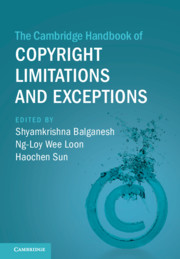Book contents
- The Cambridge Handbook of Copyright Limitations and Exceptions
- The Cambridge Handbook of Copyright Limitations and Exceptions
- Copyright page
- Contents
- Contributors
- Preface
- Part I The Theoretical Foundation of Copyright Limitations
- Part II Internationalizing Copyright Exceptions
- Part III Models of Copyright Exceptions
- 7 Debunking the Fair Use vs. Fair Dealing Myth: Have We Had Fair Use All Along?
- 8 Fair Use As an Advance on Fair Dealing? Depolarizing the Debate
- 9 The Changing Judicial Politics of Copyright Exceptions in the UK
- 10 “Fair Use” through Fundamental Rights in Europe: When Freedom of Artistic Expression Allows Creative Appropriations and Opens Up Statutory Copyright Limitations
- 11 Limitations and Exceptions in Copyright Law across the Taiwan Strait
- 12 A General Clause on Copyright Limitations in Civil Law Countries: Recent Discussion on Japanese-Style Fair Use Clause
- 13 Bridging Fair Dealing and Fair Use Concepts: Malaysia’s Transition to a Hybrid System
- Part IV Obvious and Hidden Values in the Working of Copyright Exceptions
- Part V Copyright Exceptions and Technology
10 - “Fair Use” through Fundamental Rights in Europe: When Freedom of Artistic Expression Allows Creative Appropriations and Opens Up Statutory Copyright Limitations
from Part III - Models of Copyright Exceptions
Published online by Cambridge University Press: 15 January 2021
- The Cambridge Handbook of Copyright Limitations and Exceptions
- The Cambridge Handbook of Copyright Limitations and Exceptions
- Copyright page
- Contents
- Contributors
- Preface
- Part I The Theoretical Foundation of Copyright Limitations
- Part II Internationalizing Copyright Exceptions
- Part III Models of Copyright Exceptions
- 7 Debunking the Fair Use vs. Fair Dealing Myth: Have We Had Fair Use All Along?
- 8 Fair Use As an Advance on Fair Dealing? Depolarizing the Debate
- 9 The Changing Judicial Politics of Copyright Exceptions in the UK
- 10 “Fair Use” through Fundamental Rights in Europe: When Freedom of Artistic Expression Allows Creative Appropriations and Opens Up Statutory Copyright Limitations
- 11 Limitations and Exceptions in Copyright Law across the Taiwan Strait
- 12 A General Clause on Copyright Limitations in Civil Law Countries: Recent Discussion on Japanese-Style Fair Use Clause
- 13 Bridging Fair Dealing and Fair Use Concepts: Malaysia’s Transition to a Hybrid System
- Part IV Obvious and Hidden Values in the Working of Copyright Exceptions
- Part V Copyright Exceptions and Technology
Summary
It is often assumed that an open-ended limitation to copyright, such as the fair use defense, is alien to the civil law tradition as it gives too much power to judges to design the contours of copyright law on a case-by-case basis. However, the increasing use of fundamental rights in copyright disputes in many civil law countries is challenging that assumption, raising the question of whether a sort of “fair use” limitation is not already being wielded through the weighing of interests and use of the proportionality test, both of which are required when the judiciary is applying fundamental rights. It will be shown in this chapter that even in France, traditionally considered an exemplar of civil law reasoning in copyright matters, a recent and highly commented-upon decision of the French Supreme Court concerning the balancing of freedom of artistic expression with copyright has paved the way for a judicial in concreto assessment of copyright limitations. This change in approach by the courts can be witnessed not only in France but also in many other civil law jurisdictions across Europe, and even by the Court of Justice of the European Union (CJEU), thus strengthening the argument for the introduction of an open clause for limitations in EU copyright law.
Keywords
- Type
- Chapter
- Information
- The Cambridge Handbook of Copyright Limitations and Exceptions , pp. 174 - 194Publisher: Cambridge University PressPrint publication year: 2021

